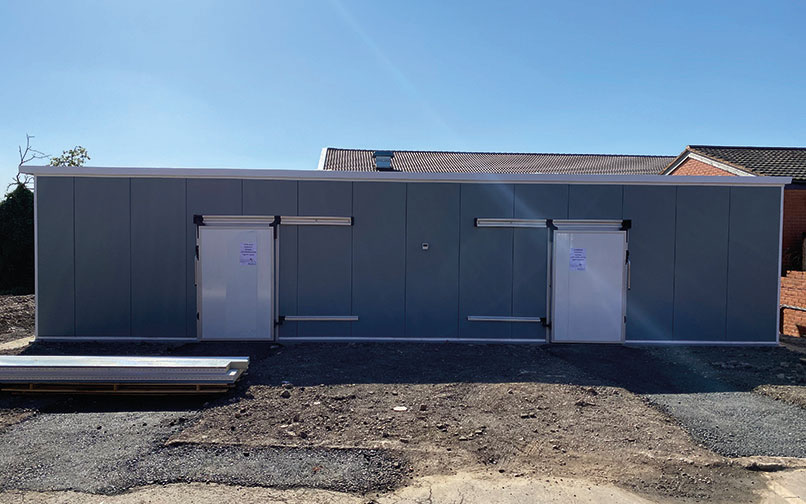Planning for the worst

West Midlands funeral director Ross Hickton has been working with local Government to keep funerals moving in one of Britain’s hardest hit areas.
Across the globe an early response has made all the difference to how COVID-19 has affected communities, and the same has been true for funeral directors at the local level.
SAIF Executive Committee member Ross Hickton, of Hickton Family Funeral Directors in Cradley Heath, started engaging with local Government in a pandemic planning meeting at the beginning of March. The plans they put into action led to a new mortuary being built on his business’s land just as the pressure was building on hospitals and crematoria six weeks later.
Speaking just as the work was completed, Ross told SAIFInsight: “We were involved in a pandemic planning meeting during the early stages, and our local authority Dudley Council indicated they had a number of units which could be constructed for temporary mortuary space. They asked if any funeral director would be able to accommodate them.
“Luckily, we’d had some ground works done on our part of the yard at our head office where we were planning to build a new block of garages and offices. So the ground works were already in, and theoretically it was a perfect location for this temporary mortuary to be built.
“We didn’t hear anything until two weeks later, when the pandemic properly hit: the death rate started going up, the local hospital was over capacity, and funeral directors locally were going over capacity, as were we. That’s when the council came and had a look at the area, and within three days we gave each other the go-ahead.
“The day after the Easter bank holiday, construction began, and it was built and near enough finished in five days. We had coffins ready to go in the next afternoon.”
Being the middle man
The West Midlands quickly became one of the hardest hit areas in the UK. In the closing stages of March, more than a third of the UK’s fatalities came from the region.
The new mortuary built on the Hickton grounds is designed to house overspill from Russells Hall Hospital in Dudley, as well as deceased under the care of Ross’s business and those from other local funeral directors who need additional storage. Its floor span can accommodate 80 coffins, which could potentially increase to more than 300.
Ross explained: “We’re doing about double the number of funerals we normally would at this time of year. Half of the deceased are people who had tested positive for COVID-19.
“The reason we have a backload of coffins now is that we can’t get any crematorium slots for at least a month. There are around a dozen crematoria in the West Midlands, we go to about 10 of them, and they are near enough all now requiring a month’s wait.
“We’re being asked to move the deceased out of the hospitals as quickly as possible because they need the space of course, but then we’re the middle man, holding the deceased and the coffins for a lot longer than we normally would, because we can’t get them booked into the crematorium in the normal two to three-week time period. It’s now four, five, six weeks.”
Making it work
It’s been a huge challenge, but early planning and effective communication have helped avoid the worst outcomes for the area. Ross praised regular updates from the councils and the decisive work of Local Resilience Forums.
He said: “I was on a couple of calls in the early days, in the planning stages, which involved the temporary mortuary at Birmingham Airport and advising the crematoria on what they can and should be doing, plus what would work for funeral directors. That was all really worthwhile.
“And we’re now getting daily updates and emails from most authorities where we have branches, as well as the crematoria keeping us updated. That is working smoothly, we’re very well informed.”
Past planning also helped ensure Ross’s business was not impacted by shortages of personal protective equipment (PPE).
“We always kept a fairly small stock, then when we realised this was going to turn into a pandemic I did bulk order PPE, which we still have stocks of.
“We have a Wolverhampton branch, and Wolverhampton City Council have been providing PPE to us on a weekly basis if we need it as well.”
Similarly, digital support the Independent had already put in place has now become a vital part of each funeral service.
“The option was there for webcasting previously, but it wasn’t taken very often. Since the pandemic means obviously not all the family can attend the funerals, webcasting is now being used in near enough every funeral.
“We now have plenty of time to arrange the funeral because of the increased wait, so it gives families more time to understand what’s going on and get their head around things.”
Whether supporting services in the midst of social isolation or building a mortuary within a week, Ross’s experiences have reflected how funeral directors, local Government and families have been pulling together to keep funerals running in even the most difficult of conditions.
“Of course it’s difficult for family members to pick and choose which people can attend their loved one’s funeral,” Ross said, “but families have been understanding.
“Social distancing is in force up and down the country and everyone understands what unfortunately has to happen at the moment.”
Tags: building, coronavirus, council, COVID-19, Cradley Heath, local government, mortuary, Ross Hickton, storage, temporary, Trevor E W Hickton